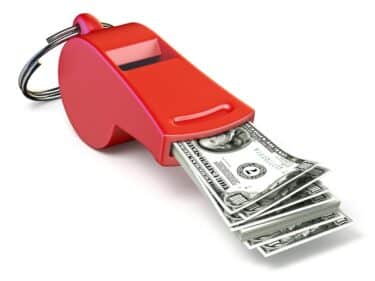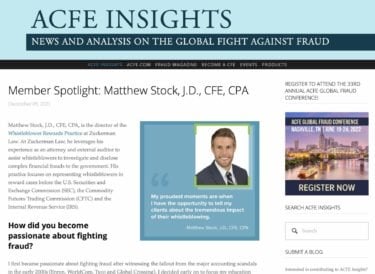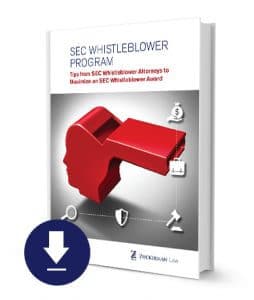Original information qualifying for an SEC Whistleblower Award

Information about a violation of the federal securities laws can be derived from your independent knowledge (facts known to you that are not derived from publicly available sources) or independent analysis (evaluation of information that may be publicly available but which reveals information that is not generally known).
An individual may be eligible to receive an award where their information leads to a successful enforcement action—meaning generally that the original information either caused the staff to open an examination or investigation, or the original information significantly contributed to a successful enforcement action where the matter was already under examination or investigation.
Our firm’s SEC whistleblower lawyers have obtained awards for whistleblowers that initiated SEC investigations and for two whistleblowers that contributed to an existing investigation. In addition, we have obtained an award for a whistleblower who provided information based on independent analysis.
Contact us for a confidential free consultation to assess whether you are eligible to obtain an SEC whistleblower award.
During FY 2021, approximately 56% of the whistleblowers who received awards provided original information that caused staff to open an investigation or examination, and approximately 44% received awards because their original information significantly contributed to an already existing investigation or examination.
In assessing whether information assisted with an ongoing matter, the Commission considers factors such as whether the information allowed the Commission to bring an action in significantly less time or with significantly fewer resources, and whether it supported additional successful charges, or successful claims against additional individuals or entities.
- Pursuant to Rule 21F-4(c)(1), the Commission will consider that a whistleblower provided original information
that led to the successful enforcement of a judicial or administrative action if the whistleblower gave the
Commission original information that was sufficiently specific, credible, and timely to cause the staff to commence
an examination, open an investigation, reopen an investigation that the Commission had closed, or to inquire
concerning different conduct as part of a current examination or investigation, and the Commission brought a
successful judicial or administrative action based in whole or in part on conduct that was the subject of the
whistleblower’s original information. - Pursuant to Rule 21F-4(c)(2), the Commission will consider that a whistleblower provided original information
that led to the successful enforcement of a judicial or administrative action if the whistleblower gave the
Commission original information about conduct that was already under examination or investigation by the
Commission, the Congress, any other authority of the federal government, a state Attorney General or securities
regulatory authority, any self-regulatory organization, or the PCAOB (except in cases where the whistleblower was
an original source of this information, and the whistleblower’s submission significantly contributed to the success of the action.
Independent Analysis SEC Whistleblower Awards
To be credited with providing “independent analysis,” the whistleblower’s examination and evaluation should contribute significant independent information that “bridges the gap” between the publicly available information and the possible securities violations. “[I]n each case, the touchstone is whether the whistleblower’s submission is revelatory in utilizing publicly available information in a way that goes beyond the information itself and affords the Commission with important insights or information about possible violations.” Adopting Release for Amendments to Whistleblower Rules, Release No. 34-89963 (Sept. 23, 2020) at 112-13.
“[T]he Commission may determine that a whistleblower’s examination and evaluation of publicly available information reveals information that is ‘not generally known or available to the public’—and therefore is ‘analysis’ within the meaning of Rule 21F–4(b)(3)—where: (1) The whistleblower’s conclusion of possible securities violations derives from multiple sources, including sources that, although publicly available, are not readily identified and accessed by a member of the public without specialized knowledge, unusual effort, or substantial cost; and (2) these sources collectively raise a strong inference of a potential securities law violation that is not reasonably inferable by the Commission from any of the sources individually.” Id. at 119; see also Order Determining Whistleblower Award Claim, Release No. 92780 (Aug. 27, 2021) (granting award to claimant whose information was the “product of unusual effort and expertise developed over many years”).
SEC Whistleblower Attorneys






For more information about whistleblower rewards and bounties, contact the SEC whistleblower lawyers at Zuckerman Law at 202-262-8959.
Click below to hear SEC whistleblower lawyer Matt Stock’s tips for SEC whistleblowers:
Recently the Association of Certified Fraud Examiners published a profile of SEC whistleblower lawyer Matt Stock’s success working with whistleblowers to fight fraud:
To learn more about the SEC Whistleblower Program, download Zuckerman Law’s eBook: SEC Whistleblower Program: Tips from SEC Whistleblower Attorneys to Maximize an SEC Whistleblower Award:
- See our column in Forbes: One Billion Reasons Why The SEC Whistleblower-Reward Program Is Effective.
- See our column in Going Concern: Sarbanes-Oxley 15 Years Later: Accountants Need to Speak Up Now More Than Ever.
- See our post in Accounting Today: Whistleblower Protections and Incentives for Auditors and Accountants.
- See our article providing Tips for SEC Whistleblowers
- See our post in The Compliance and Ethics Blog: Shkreli Trial Reveals the Challenges Faced by Compliance Whistleblowers.
How to Get an SEC Whistleblower Award
SEC Whistleblower Awards
Tips to Successfully Navigate the Process to Qualify for SEC Whistleblower Award
“Original Information” Eligible for an SEC Whistleblower Award
The May 2011 SEC release (Release No. 34-64545) adopting the rules governing the SEC Whistleblower Program clarifies the scope of “original information” that can qualify for an SEC whistleblower award:
- Under Rules 21F-4(b)(5) and (6) an individual can be considered the original source of information provided to the Commission by another source (including the individual’s employer), or of information that “materially adds” to information already in our possession.
- Further, Rule 21F-4(c), as adopted, provides that a whistleblower may be eligible for an award based upon information that the whistleblower reports through a company’s internal legal and compliance procedures if the company subsequently provides the information to the Commission.
- Rule 21F-4(c) provides that, even after an investigation has commenced, a whistleblower can be eligible for award consideration if he or she provides original information that significantly contributes to the success of the Commission’s action. Thus, our rules will permit awards to subsequent whistleblowers in appropriate circumstances.
- Similarly, we believe that several provisions in our rules will ordinarily operate to exclude whistleblowers whose only source of original information is an existing investigation or proceeding. Information that is exclusively derived from a governmental investigation is expressly excluded from the definition of “original information” under Section 21F(a)(3) of the Exchange Act and our Rule 21F-4(b)(1)(iii).
- A whistleblower who learns about possible violations only through a company’s internal investigation will ordinarily be excluded from claiming “independent knowledge” by operation of either the exclusions from “independent knowledge” set forth in Rules 21F-4(b)(4)(i), (ii), and (iii) (relating to attorneys, auditors, and other persons who may be involved in the conduct of internal investigations), or by Rule 21F-4(b)(4)(vi) (excluding information learned from such individuals). To the extent that information about an investigation or proceeding is publicly available, it is excluded from consideration as “independent knowledge” under Rule 21F-4(b)(2).
“Independent Knowledge” Eligible for an SEC Whistleblower Award
The May 2011 SEC release (Release No. 34-64545) adopting the rules governing the SEC Whistleblower Program clarifies the scope of “independent knowledge” that can qualify for an SEC whistleblower award:
- “Independent knowledge” means any factual information in the whistleblower’s possession that is not derived from publicly available sources. Congress primarily intended our whistleblower program “*** to motivate those with inside knowledge to come forward and assist the Government to identify and prosecute persons who have violated the securities laws ***.” It is consistent with this purpose to require that “independent knowledge” be derived from a whistleblower’s own experiences, observations, or communications, and not from information that is available to the general public.
- While we thus exclude information derived from publicly available sources from the definition of “independent knowledge,” we do not believe that “independent knowledge” should be further limited to direct, first-hand knowledge. Such an approach could prevent the Commission from receiving valuable information about possible violations from whistleblowers who are not themselves involved in the conduct at issue, but who learn about it through their observations, relationships, or personal diligence. Our final rules provide that, in order to be considered eligible for an award, a whistleblower must provide information that is sufficiently specific, credible, and timely that it causes the staff to open an investigation, or significantly contributes to the success of an enforcement action.
- The exclusions generally apply to narrow categories of individuals whose knowledge does not, in our view, constitute “independent knowledge or analysis of a whistleblower,” because the information or analysis was acquired by an individual: (1) On behalf of a third party operating in a sensitive legal, compliance, or governance role (exclusions (i), (ii) and (iii)(A)-(C)); or (2) in the performance of an engagement required by the Federal securities laws (exclusion (iii)(D)); or (3) by illegal means (exclusion (iv)). Only when one of the exceptions to these exclusions set forth in the rules applies should information acquired in these situations constitute independent knowledge or analysis of the whistleblower. We believe this result is consistent with the purpose of promoting effective enforcement of the securities laws. Consultation with attorneys can improve compliance on the part of entities and individuals. The recommended exclusions for certain company officials and third parties who assist companies in investigations of possible violations of law are narrowly focused, and promote the goal of ensuring that the persons most responsible for an entity’s conduct and compliance with law are not incentivized to promote their own self-interest at the possible expense of the entity’s ability to detect, address, and self-report violations. The exclusion for auditors performing engagements required by the securities laws reflects the fact that these individuals occupy a special position under the securities laws to perform a critical role for investors. Further, as adopted, our rule permits such individuals to become whistleblowers under certain circumstances.
Independent Analysis Eligible for an SEC Whistleblower Award
The September 2020 SEC release (Release No. 34-89963) adopting amendments to the rules governing the SEC Whistleblower Program explains the SEC’s interpretation of “independent analysis” that merits an SEC whistleblower award.
After considering the comments, we have decided to adopt the interpretive guidance as proposed with one additional interpretation. Subject to Section 21F(a)(3)(C) of the Exchange Act,321 in the exercise of our discretion the Commission may determine that a whistleblower’s examination and evaluation of publicly available information reveals information that is “not generally known or available to the public”–and therefore is “analysis” within the meaning of Rule 21F-4(b)(3)–where: (1) the whistleblower’s conclusion of possible securities violations derives from multiple sources, including sources that, although publicly available, are not readily identified and accessed by a member of the public without specialized knowledge, unusual effort, or substantial cost; and (2) these sources collectively raise a strong inference of a potential securities law violation that is not reasonably inferable by the Commission from any of the sources individually.
Our experience in administering the whistleblower program, and our review of the comments submitted, confirm the existence of uncertainty regarding the requirement of Rule 21F-4(b)(3) that independent analysis must “reveal [] information that is not generally known or available to the public.” By clarifying our application of the rule, we expect to encourage more high-quality submissions that may result in successful enforcement actions, promote transparency, reduce the volume of non-meritorious claims, and increase the efficiency of the whistleblower program.
The interpretive guidance is not intended to discourage tips from financial services professionals and others who develop key insights and illuminate possible violations through the application of expertise to the review and evaluation of publicly available information. Moreover, as we explained, technical expertise is not a requirement under the guidance. We expect to treat as “independent analysis” highly-probative submissions in which the whistleblower’s insights and evaluation provide significant independent information that “bridges the gap” between the publicly available information itself and the possibility of securities violations. The additional guidance we are adopting adds further clarification by describing a specific path available to experts and non-experts alike who devote substantial time and effort and develop unique insights from bringing together information from multiple specialized or difficult-to-obtain sources.
Conversely, our experience has shown that some claimants seek awards based on submissions that do little more than highlight information that is reasonably evident from the public sources. We gave as examples cases where the whistleblower points to common hallmarks of fraud on the face of the public materials (e.g., impossibly high, guaranteed investment returns or extravagant claims in press releases) or to public discourse (e.g., discussions on a public message board) in which investors or others are alleging a fraudulent scheme. Submissions of this type do not constitute “independent analysis.” We emphasize, however, that there is no bright-line test and whether any particular submission contains sufficient independent insights to rise to the level of analysis -and, hence, “original information”–will depend on all of the facts and circumstances of the case.
In addition to promoting transparency and efficiency in the operation of our whistleblower program, we continue to believe that Congress did not intend that we should pay whistleblower awards merely for alerting the Commission staff to publicly-available information. The model for “independent analysis” that Congress had before it at the time was the detailed and sophisticated work performed by Harry Markopolos to expose the Madoff fraud, which consisted of more than simply providing the Commission with already-public information.
In conformance with this limitation, our interpretive guidance adapts to the Section 21F context the framework that has found widespread acceptance among federal courts of appeals for determining when fraudulent transactions are deemed to already be publicly disclosed under analogous provisions of the federal False Claims Act.322 Although commenters criticized this approach as permitting the Commission to make a “retroactive” determination of whether the violations were “reasonably apparent,” we view the framework as an important analytical tool to help inform our judgment on a dispositive question under Section 21F: whether a whistleblower’s submission is original, and not merely a recitation of publicly available information. We observe further that, to the extent that our evaluation under the guidance is backward-looking, it is reasonably based only on information that was publicly available at the time of the whistleblower’s tip; it does not evaluate the whistleblower’s submission in light of any information that subsequently became public or in light of the investigative record.323
We are conscious of the concern expressed by some commenters that individual Enforcement staff assigned to the investigation will be responsible for determining whether the publicly available information was sufficient to raise an inference of the violations. This is not the case. In our award process, all determinations relevant to award entitlement–including whether the claimant provided “original information”–are made in the first instance by the CRS, which currently is comprised of the Director and Deputy Director of the Enforcement Division and five other Enforcement senior officers. Further, all preliminary award denials that are contested are adjudicated by the Commission. As a result, the role of the individual Enforcement staff member is merely to relay to the CRS the facts relative to the investigation that are pertinent to the CRS’s deliberations. It is the job of the CRS (and ultimately the Commission) to determine whether the claimant’s submission constitutes “independent analysis” through the application of an objective, rather than a subjective, standard of reasonableness to the record. The interpretive guidance we are adopting provides a framework, consistent with existing legal standards, for making this judgment.
The commenters who urged that the test for “independent analysis” turn on whether the whistleblower provided information of which the staff was not aware and that, in fact, caused the staff to take action would read the “analysis” requirement out of the statute. Under the second prong of “original information” (Section 21F(a)(3)(B)), we are required to determine that information provided by a whistleblower was “not known to the Commission from any other source”; and under Section 21F(b)(1) we must determine that original information provided by a whistleblower “led to” the successful enforcement of a Commission covered action or a related action.324 We are obliged to interpret “analysis” in the first prong of “original information” (Section 21F(a)(3)(A)) in a manner that gives independent meaning to this term and is not redundant of the requirements that a whistleblower’s information be unknown to the Commission and lead to a successful enforcement action.325
Put another way, in order to merit an award a whistleblower, among other things, must provide information that is not known to the Commission from any other source, that leads to successful enforcement, and that also comprises “independent analysis” (or “independent knowledge”). Importantly, no commenters suggested any alternative interpretations that would distinguish submissions that provide “analysis” of publicly available information from those that fail to do so.
Our conclusion is buttressed by our reading of Section 21F(a)(6)326 in conjunction with Section 21F(b)(1).327 Section 21F(a)(6) defines a ““whistleblower,” in relevant part, as an individual (or two or more individuals acting jointly) who provide “information” relating to a violation of the securities laws to the Commission. However, Section 21F(b)(1) authorizes us to pay awards only to whistleblowers who provide “original information” to the Commission. We read these provisions as reflecting Congress’s understanding that “information” and “original information” are distinct concepts, and that some number of individuals who are “whistleblowers” by virtue of the ““information” they provide to the Commission may not also qualify as having provided “original information.” We cannot interpret “independent analysis” in a way that erases these distinctions and provide awards for any “information” that results in a successful enforcement action.
Further, we observe that Section 21F(a)(3)(C) requires that “original information” not be “exclusively derived … from the news media.”328 However, the “news media” is not limited to conventional news sources. The Supreme Court has indicated that the identical term in the False Claims Act’s public disclosure bar has “broad sweep,”329 and lower courts interpreting that provision have held that “news media” include publicly available websites that promote a company’s services and products.330 Thus, in many cases, fulfilling our statutory duty not to grant awards for information that is “exclusively derived … from the news media” will require that we find in the whistleblower’s purported “analysis” a degree of substance that goes beyond the information available on the face of a public website.331
Finally, in response to those commenters who expressed concern that the proposed interpretive guidance would discourage individuals from taking the significant personal and professional risks of becoming whistleblowers, we note that our rules provide whistleblowers with the ability to submit tips anonymously.332 Further, the interpretive guidance as proposed, as well as the additional interpretation adopted today, will enable such professionals to be treated as having provided “original information” in appropriate cases.
Internal Whistleblowing Qualifies for an SEC Whistleblower Award if the Whistleblower Reports the Violation to the SEC Within 120 Days of Making an Internal Disclosure
An order awarding a whistleblower $1.8 million explains how internal whistleblowing qualifies for an SEC whistleblower award:
Exchange Act Rule 21F-4(b)(7) and Exchange Act Rule 21F-4(c)(3). Exchange Act Rule 21F-4(b)(7) states in relevant part that if a claimant provides information to an entity’s internal whistleblower, legal or compliance procedures for reporting allegations of possible violations of law, and then, within 120 days, submits the same information to the Commission, then for purposes of evaluating a claim for award, the Commission will consider that claimant provided the information as of the date of the original disclosure, report or submission. Further, Exchange Act Rule 21F-4(c)(3) provides that a claimant’s original information will be deemed to have led to a successful enforcement action if:
(3) You reported original information through an entity’s internal whistleblower, legal, or compliance procedures for reporting allegations of possible violations of law before or at the same time you reported them to the Commission; the entity later provided your information to the Commission, or provided results of an audit or investigation initiated in whole or in part in response to information you reported to the entity; and the information the entity provided to the Commission satisfies either paragraph (c)(1) or (c)(2) of this section. Under this paragraph(c)(3), you must also submit the same information to the Commission in accordance with the procedures set forth in §240.21F-9 within 120 days of providing it to the entity.
Here, Claimant reported original information through the internal compliance system at Redacted (the “Company”), and provided the same information in a Form TCR to the Commission within 120 days. Therefore, Claimant is deemed to have reported the information to the Commission as of the date of Claimant’s report to the Company. Initiated in part in response to Claimant’s tip, the Company, in turn, launched an internal investigation into the alleged misconduct and subsequently reported the findings to the Commission. Further, the Company’s report of the findings of its internal investigation caused the Commission to open an investigation, and the resulting Covered Action was based in part on the conduct alleged by Claimant and reported by the Company, in satisfaction of Exchange Act Rule 21F-4(c)(1).
Applying the award criteria in Exchange Act Rule 21F-6 to the specific facts and circumstances here, we have chosen to increase the award to Claimant. 3 In reaching this determination, we positively assessed the following facts: (i) Claimant’s tip was significant in that it was a key source that formed the underlying basis of the Company’s internal investigation; (ii) Claimant timely reported the securities violations to the Company and ultimately, the Company’s findings focused the Commission’s investigation, revealed misconduct overseas that is difficult to detect and investigate, and conserved significant Commission staff time and resources; (iii) the law enforcement interest is substantial here because the Company had previously been sanctioned for similar misconduct; and (iv) the Claimant took both personal and professional risks in
reporting this information. In considering the appropriate award percentage, we have also determined to credit Claimant for the results of the Company’s internal investigation that were provided to the Commission and that ultimately formed the basis for the Covered Action.
Release No. 89996 (Sept. 25, 2020).
whistleblower_lawyers_012017_infographicOriginal information is any information that’s not otherwise already known by the SEC and this is why it’s important that when whistleblowers become aware of a violation, that they submit this information to the SEC as quickly as possible because if another individual submits the same information or information about the same violation, your information will no longer be considered original information and you will not be eligible for an award under the program.





